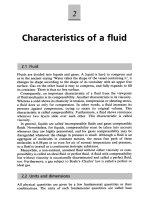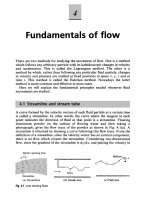INTRODUCTION TO OCAML
Bạn đang xem bản rút gọn của tài liệu. Xem và tải ngay bản đầy đủ của tài liệu tại đây (106.77 KB, 24 trang )
<span class="text_page_counter">Trang 1</span><div class="page_container" data-page="1">
<small>Based on CS 3110 course notesand an SML tutorial by Mike George</small>
</div><span class="text_page_counter">Trang 2</span><div class="page_container" data-page="2">Installing OCaml
<small>I</small>
Linux:
yum install ocamlapt-get install ocamlemerge dev-lang/ocaml
<small>I</small>
Windows:
Get the Microsoft-based native Win32 port
<small>I</small>
OCaml toplevel system demo
</div><span class="text_page_counter">Trang 4</span><div class="page_container" data-page="4">Base Types
letx : int = -7
lety : char = ’a’
letz : string = "moo"
letw : float = 3.14159
letv : bool = true
<small>I</small>
OCaml has type inference
<small>I</small>
Type declarations are optional in many places
<small>I</small>
But having them makes it much easier todebug type errors!
</div><span class="text_page_counter">Trang 5</span><div class="page_container" data-page="5">Tuples and Datatypes
(* Tuples (a.k.a. product types) *)
let t1 : int * int = (3, 5)
let t2 : string * bool * char = ("moo", true, ’q’)
let t3 : unit = () (* The empty tuple *)(* A simple datatype (like enum or union) *)
type suit = Spades | Diamonds | Hearts | Clubs
let c : suit = Clubs
</div><span class="text_page_counter">Trang 6</span><div class="page_container" data-page="6">More Datatypes
(* Datatype constructors can carry values *)(* and be recursive (and look like CFGs) *)
type var = string
type exp = Var of var
| Lam of var * exp| App of exp * exp
let id : exp = Lam ("x", Var "x")
let w : exp =
App (Lam ("x", App (Var "x", Var "x")),Lam ("x", App (Var "x", Var "x")))
<small>I</small>
Can build up tuples and datatypes...
<small>I</small>
How to break them down and actually usethem?
</div><span class="text_page_counter">Trang 7</span><div class="page_container" data-page="7">Pattern Matching
let t1 : int * int = ...
(* Binds two variables at once *)
</div><span class="text_page_counter">Trang 8</span><div class="page_container" data-page="8">More Pattern Matching
let suitname : string =
(* Says the same thing and is better style: *)
let x : int = if b then 1 else 0
</div><span class="text_page_counter">Trang 9</span><div class="page_container" data-page="9">More Pattern Matching
let suitname : string =
(* Says the same thing and is better style: *)
let x : int = if b then 1 else 0
</div><span class="text_page_counter">Trang 10</span><div class="page_container" data-page="10">A Warning about Pattern Matching
(* What does this evaluate to? *)
let pair = (42, 611)
let x = 611
match pair with
(x, 611) -> 0| (42, x) -> 1| _ -> 2
<small>I</small>
Patterns can refer to datatype constructors andconstants
<small>I</small>
But cannot refer to pre-existing variables
<small>I</small>
They can only declare new variables
</div><span class="text_page_counter">Trang 11</span><div class="page_container" data-page="11">A Warning about Pattern Matching
(* What does this evaluate to? *)
let pair = (42, 611)
let x = 611
match pair with
(x, 611) -> 0| (42, x) -> 1| _ -> 2
<small>I</small>
Patterns can refer to datatype constructors andconstants
<small>I</small>
But cannot refer to pre-existing variables
<small>I</small>
They can only declare new variables
</div><span class="text_page_counter">Trang 12</span><div class="page_container" data-page="12">(* A variable with a function value *)
let square : int -> int =
fun (x:int) -> x * x (* anonymous fun! *)(* Same thing, more succinct *)
let square (x:int) : int = x * x
</div><span class="text_page_counter">Trang 13</span><div class="page_container" data-page="13">Recursive Functions
let rec fact (x:int) : int =if x = 0 then 1
else x * (fact (x-1))
(* Mutually recursive functions *)
let rec isOdd (x:int) : bool =x != 0 && isEven (x-1)
and isEven (x:int) : bool =x = 0 || isOdd (x-1)
</div><span class="text_page_counter">Trang 14</span><div class="page_container" data-page="14">More Functions
(* How many arguments does this take? *)
let rec gcd (a, b) : int =
if b = 0 then a
else gcd (b, a mod b)
(* More explicitly: *)
let rec gcd (p : int * int) : int =
match p with (a, b) ->
if b = 0 then a
else gcd (b, a mod b)
</div><span class="text_page_counter">Trang 15</span><div class="page_container" data-page="15">More Functions
(* How many arguments does this take? *)
let rec gcd (a, b) : int =
if b = 0 then a
else gcd (b, a mod b)
(* More explicitly: *)
let rec gcd (p : int * int) : int =
match p with (a, b) ->
if b = 0 then a
else gcd (b, a mod b)
</div><span class="text_page_counter">Trang 18</span><div class="page_container" data-page="18">Local Declarations (including local functions)
(* Newton’s method of approximation *)
let rec newton f guess : float =
let goodEnough = abs float (f guess) < 0.0001
if goodEnough then guess
elselet
</div><span class="text_page_counter">Trang 19</span><div class="page_container" data-page="19">| Cons of (’a * ’a lst)
let rec map (f:’a -> ’b) (l:’a lst) : ’b lst =
match l with
Empty -> Empty
| Cons (hd, tl) -> Cons (f hd, map f tl)
</div><span class="text_page_counter">Trang 20</span><div class="page_container" data-page="20">| Cons of (’a * ’a lst)
let rec map (f:’a -> ’b) (l:’a lst) : ’b lst =
match l with
Empty -> Empty
| Cons (hd, tl) -> Cons (f hd, map f tl)
</div><span class="text_page_counter">Trang 21</span><div class="page_container" data-page="21"><small>I</small>
OCaml has lists built-in
<small>I</small> [] is the empty list<small>I</small> :: is the cons operator
<small>I</small> @ is the append operator
<small>I</small> [1; 2; 3] is a three-element list(note the semicolons)
let rec reverse (l : ’a list) : ’a list =
</div><span class="text_page_counter">Trang 22</span><div class="page_container" data-page="22">Putting It All Together
<small>I</small>









